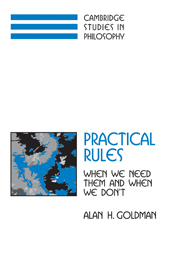1 - Moral Rules
Published online by Cambridge University Press: 23 July 2009
Summary
OUTLINE OF THE TASK
My main task in this first chapter is to determine when rules are required for moral reasoning and when they are not, when, indeed, they are better dispensed with. The mark of a genuine rule is universal prescription. Such rules tell us what to do, or at least how to reason, in all cases to which they apply. Genuine moral rules connect natural or nonmoral properties universally to moral prescriptions. They tell us what to do whenever certain situations occur, situations that can be identified without moral reasoning.
Such rules can be broad or narrow. Their scope or range of application is determined by the extensions of the terms in which they are stated. “Don't torture kittens” applies to all young cats and orders us not to inflict severe pain on them. If we know the meaning of the nonmoral term “kittens,” and if the term “torture” is used here to mean the infliction of severe pain (nonmoral terms), then we know what the rule unambiguously tells us to refrain from doing in all situations involving kittens.
Some expressions that appear to be rules, whose statements are universal or seem to apply to all things of a stated kind, can be reduced in practice (as they are actually used) to expressions without universal terms. Such expressions are not really universally prescriptive, although their form would suggest that they are.
- Type
- Chapter
- Information
- Practical RulesWhen We Need Them and When We Don't, pp. 10 - 61Publisher: Cambridge University PressPrint publication year: 2001



